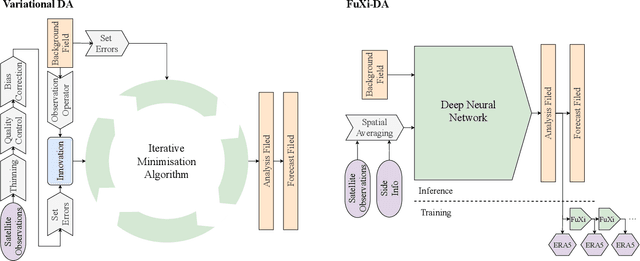Fuxi-DA: A Generalized Deep Learning Data Assimilation Framework for Assimilating Satellite Observations
Paper and Code
Apr 12, 2024



Data assimilation (DA), as an indispensable component within contemporary Numerical Weather Prediction (NWP) systems, plays a crucial role in generating the analysis that significantly impacts forecast performance. Nevertheless, the development of an efficient DA system poses significant challenges, particularly in establishing intricate relationships between the background data and the vast amount of multi-source observation data within limited time windows in operational settings. To address these challenges, researchers design complex pre-processing methods for each observation type, leveraging approximate modeling and the power of super-computing clusters to expedite solutions. The emergence of deep learning (DL) models has been a game-changer, offering unified multi-modal modeling, enhanced nonlinear representation capabilities, and superior parallelization. These advantages have spurred efforts to integrate DL models into various domains of weather modeling. Remarkably, DL models have shown promise in matching, even surpassing, the forecast accuracy of leading operational NWP models worldwide. This success motivates the exploration of DL-based DA frameworks tailored for weather forecasting models. In this study, we introduces FuxiDA, a generalized DL-based DA framework for assimilating satellite observations. By assimilating data from Advanced Geosynchronous Radiation Imager (AGRI) aboard Fengyun-4B, FuXi-DA consistently mitigates analysis errors and significantly improves forecast performance. Furthermore, through a series of single-observation experiments, Fuxi-DA has been validated against established atmospheric physics, demonstrating its consistency and reliability.
 Add to Chrome
Add to Chrome Add to Firefox
Add to Firefox Add to Edge
Add to Edge